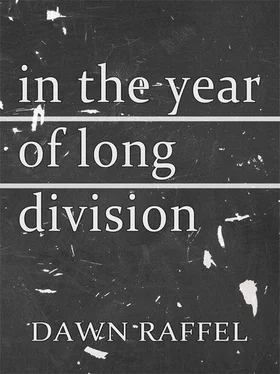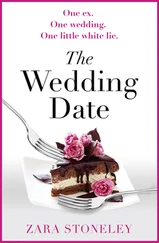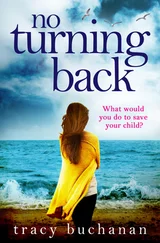HE is holding my foot, my father is. “Flex,” he says.
The woman jumps.
“How does it feel?” my father says.
“Sore,” I say. Impossible, the height.
“Very sore.”
…The woman lilts, floats, rises, impossibly rises.
“Sprained,” I say. (I have had lessons.) “Horribly sprained.”
“Not likely,” my father says. “Couldn’t. You hardly were moving.”
“Was,” I say.
“Can’t be,” he says.
“Could,” I say.
“Could so,” I say.
“You are so small,” my father says. “You didn’t have very far to—”
“Wait,” I say. “There was a second in the air, I remember, when everything—”
“Slipped,” my father says. We are all interruption.
“Spun,” I say. “It—”
“—Most you did was slip,” my father says. “Scratched, tops. More or less—”
“Please,” I say.
“More or less nothing.” My father is moving. “I am waiting,” he says.
“Still waiting,” he says.
“Can’t hear you,” my father says.
I am on bony, graceless knees.
The woman is glowing, effulgent.
I could be imploring.
“TELL me,” he says. “What?”
There is a way that whatever you turn away from owns your heart. There is a way that it doesn’t.
He is touching my neck, a clasp, mesh. We are under a shimmering sky.
He is still waiting.
I am in white. “Carry me,” I say.
FROM there, they went north. Not due north, but north. What difference? Fearless, or nervy with fear, young — she younger than he was, unless she was lying. Cold, too. She was cold, she said. He turned cuffs. No coat. No heels. Deliberate earth. “I am never cold,” he said. He unbuttoned. Rude streets. The sorrow of commerce in a town passed through. A qualmy, lonely light. It was always a certain kind of day in the places where they were not expected. Broken. “Salt,” she said. She liked to lurk, or said she did, or mostly did, or did not mind, she said. She was keen, she said, of certain necessary senses. Torsos, armless in windows, beckoned — faces planed and shopworn chins aloof. She registered keenly, slanted into arrogance. He inhaled. What she smelled was salt, she said, greasy and vended, and sweat-soaked flannel, and rusty, wasted cats. She predicted weather. Board, chalk, brick. Cashier. An alley, germy and wrappered, delinquently wet. She stole. He paid. They stole. Squares peeled off, gray as the rumbling vehicle gray of slow escape. She was hoarding unnatural heat. Planks and spires — nowhere for his knees, he said, on this poor bus; litter in the aisle — poles and lean-tos, shambling, water-rotted shacks with laundry drably flapping, a chicken in the dirt looking lost. “No?” she said. “Yes,” he said, agreeing. He was tall in these parts. She chattered. Futile, this artificial heat. Nothing was growing. A vista gaped: grainy, reliefless, limbless nothing, corroded, expired, until the eyes renewed it. Their eyes did. Birds rose. Stiff fields cropped up. Trees sprawlingly rooted, restless, wormy flanks, a river veering gangly, passably north.
Go on.
Name her.
Rae will do.
It did for him.
He called her that, Rae. He went by Frank, and Hal, and Tom, Wayne, Wade, Enoch, and also, once, in a by-gone place, by Juan. Need, he said. Need and latitude. Depending, he said. She could depend, Rae could, he said, on this, the need, whichever way it was he went — by land, by ditch, by various, sometimes-legal strategies, chap-lipped, largely loosely strung, unevenly featured, if fair. “Hans?” he said. “Lars?”
She called him Vern.
It got darker faster the farther north they went.
They went far.
There were scenes, of course, some quiet. Does it matter what was said? And who did not answer? And how it was that she, Rae, might have looked, in a setting, from an angle, in sleep? “Still,” he said. “Too still,” he said. A quiet prod. “I am sleeping,” she said, turning — never a blanket, no pillow. “Not me,” he said. “I never am sleeping. Rae?” he said. “Doll,” he said, some other place. Her cheek on prayered hands, her hair, its darkness spilling in a dark arrangement as if in the wave of a dream.
There was something like a smile on her lips.
He smiled, nearly. What he did, it seemed, was watch.
“Mercy,” she said. Awake in a changed landscape, saying it, mercy , or something like it, like a curse. Such fists she had — a child’s. The eyes she was born with. A rub. “Where am I?” she said, was everywhere saying.
Bent. Trapped. A too-small and vastly horrible enclosure. The world inside her mouth. A roiling basin. Her wan face — flipped, a mole on the opposite cheek, the only way to see herself, reversed. Knocking. A clockwise rush, as was correct. A trickle in a drain.
Knocking.
Coffee from somewhere.
“Vern?” she said.
“Milk?” she said, not too much farther on.
“I could rightly eat,” she said.
“You could?” he said.
“Could you?” she said.
“Could I?” he said.
Thick crepe soles. An aproned, creamy hip, belonging to a woman awaiting an order. A pencil, apparently gnawed.
“If wishes were gravy,” Rae said.
“What then?” he said.
“We’d both be as big as a house,” she said. She cupped a cup with ashy, slender fingers as if absorbing sustenance.
“We’ll get there,” he said.
“Will we?” she said. “Where is it, this house?”
She, it seemed, could scarcely sit.
“Vern?” she said.
“George,” he said. “What was the question?”
Knives, stubs, crumbs, a map on a place mat, locks she’d picked, and pilfered, cut-rate condiments were barely concealed in dubious sites about her person. There was something in her bosom.
“What is it?” he said.
“We’ll starve,” she said.
“No,” he said.
“You’re right,” she said. “Likely we’ll freeze first.”
Picture a low-slung man. Low-slung men slunk by. Eggs, meat, fat slung-out stacks of cakes. “Mercy, mercy me,” she said. All belly, these eaters, and just about visibly silver-lined pockets — hip, front — and cloudy expressions and humid, insinuating posture.
“Not much of a question, is it?” he said. He rolled his sleeves, his gait. “Gents,” he said.
She predicted travel.
“Myself and my wife,” he said.
“Shove over,” she said.
“Crook,” she said. “I knew it.”
His skin was bright. They were bumping in the bed of a truck. Distended tracks lay on the earth. Small stones were flying. “Rae?” he said. “How can a person sleep?” she said. Glazed, raw — a plaintively lovely vegetation. She tasted herself. This was not sex: vagrant, edgy union — theirs — conjoining in an alley, a pew, in the middle of some earthly nowhere, planted, lying, lying down. This was not that. “I am freezing,” she said.
It snowed.
“Listen,” she said. “Are you listening?” Thick snow lit on her lashes. Her hair went slowly gray. Her face she held slantwise.
“Look at my hands,” she said.
“Feel my hands,” she said. “Ice.”
His shirt was drenched. His back seemed somehow to vibrate, distinct from her, apart from the bump and grind of riding, herky-jerky, on too many threadbare wheels.
“I am burning up,” he said, when what he was doing was seizing up.
A low moon slid.
Rae formed a syllable. Shook dark her hair. Blanketed him with the insubstantial wrap of her body, little of it as there was.
Gourds, a branch, a rootlike object — things showed warped, defying their rightful contours.
“Vern,” she said.
“You,” she said. “Are you listening, you?”
Читать дальше












